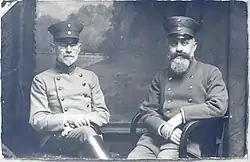Emmanuel Carlebach
Emanuel Shalom Menachem Carlebach dit Emanuel (ou Emmanuel) Carlebach (, Lübeck, Empire allemand-, Cologne, Rhénanie-du-Nord-Westphalie) est un rabbin allemand, qui durant la Première Guerre mondiale, avec le rabbin Pinchas Kohn (1867-1941), est un conseiller rabbinique pour les forces d'occupation allemandes en Pologne. Il collabore étroitement dans cette capacité avec le grand-rabbin hassidique de Gour, le rabbin Avraham Mordechai Alter (1866–1948). De cette collaboration va naître le mouvement de l'Agoudat Israel, visant à unifier le judaïsme européen, de l'Est et de l'Ouest. Il est rabbin à Memel, aujourd'hui Klaipėda en Lituanie, puis à Cologne (Allemagne). C'est un oncle du rabbin Shlomo Carlebach.
| Naissance | |
|---|---|
| Décès | |
| Nationalité | |
| Activité | |
| Père |
Salomon Carlebach (d) |
| Mère |
Esther Carlebach (d) |
| Fratrie |
Ephraim Carlebach Joseph Carlebach Hartwig Naftali Carlebach David Carlebach (d) |
| Parti politique | |
|---|---|
| Conflit |
Biographie
Emmanuel Carlebach[1] est né le Lübeck, Empire allemand.
Il est un des sept fils du rabbin Salomon (Shlomo) Carlebach[2] et de Esther Adler, Son père, Salomon Carlebach, né le à Bruchsal, Karlsruhe, grand-duché de Bade et mort le à Lübeck, est le rabbin de Lübeck[3]. Sa mère, Esther Adler, est née le à Lübeck, fille de l'ancien rabbin de Lübeck, rabbi Alexander Sussmann Adler (de) (1816-1869), et est morte dans cette ville le [4]. Quatre de ses frères deviennent aussi rabbins : Ephraim Carlebach (1879-1936), Joseph Carlebach (1883-1942), David Carlebach (1885-1913) et Hartwig Naftali Carlebach (1889-1967). Ses autres frères sont: Alexander Carlebach (1872-1925), Shimshon Carlebach (1875-1942), Moshe Carlebach (1881-1939) et ses sœurs sont Bella Carlebach (1876-1961), Sara Carlebach (1880-1928), Cilly Carlebach (1884-1968) et Miriam Carlebach (1888-1962)[5].
Son fils, Alexander Carlebach (, Cologne-), immigre en 1935 au Royaume-Uni. Il devient rabbin du Golders Green Beth Hamedrash puis du North Hendon Adath Synagogue, à Londres. Il devient grand-rabbin de Belfast et d'Irlande du Nord de 1954 à 1965 et immigre en Israël, en 1966[6].
Études
Emmanuel Carlebach fait ses études rabbiniques au Séminaire rabbinique Hildesheimer de Berlin. Sa thèse de doctorat en 1896 à l'université de Würtzburg s'intitule: Guyau's metaphysische Anschauungen[7].
Memel
Emmanuel Carlebach est le rabbin de Memel, aujourd'huui Klaipėda en Lituanie, de 1898 à 1904[8] - [9].
Cologne
Emmanuel Carlebach devient ensuite le rabbin de Cologne en Rhénanie-du-Nord-Westphalie, Allemagne[10] - [11].
Pologne

Durant la Première Guerre mondiale, avec le rabbin Pinchas Kohn (1867-1941), est un conseiller rabbinique pour les forces d'occupation allemande en Pologne[12]. Il collabore étroitement dans cette capacité avec le grand-rabbin hassidique de Gour, le rabbin Avraham Mordechai Alter (1866–1948). De cette collaboration va naître le mouvement de l'Agoudat Israel, visant à unifier le judaïsme européen, de l'Est et de l'Ouest[13] - [14] - [15] - [16] - [17] - [18].
Il établit une école secondaire pour filles à Varsovie, l'école Chawaceles, en 1915. Il choisit comme directrice Sara Tennenwurce, la grand-mère de la célèbre socio-linguiste américaine Deborah Tannen[19].
Bibliographie
- (de) Berlin. Rabbiner-Seminar. Jahresbericht: 1873-1898. 1898
- (en) Isidore Singer & Cyrus Adler. The Jewish Encyclopedia: Leon-Moravia. Volume 8 of The Jewish Encyclopedia. Funk & Wagnalls, 1904
- (de) Verein für Jüdische Geschichte und Literatur zu Memel. Festgabe zu Chanuka 5669 (1908) des Vereins für Jüdische Geschichte und Literatur zu Memel. F.W. Siebert, 1908
- (en) Steven E. Aschheim. Brothers and Strangers: The East European Jew in German and German Jewish Consciousness, 1800–1923. University of Wisconsin Press, 1982. (ISBN 0299091139), (ISBN 9780299091132)
- (en) W. Rubinstein & Michael A. Jolles. The Palgrave Dictionary of Anglo-Jewish History. Springer, 2011. (ISBN 0230304664), (ISBN 9780230304666)
Notes et références
- (en) The Treasure of the Torah. The Story of the Rabbi Family Auerbach. rochesterholocaustsurvivors.org/. Dans le judaïsme allemand, comme noté ici, les rabbins Auerbach, Bamberger et Carlebach sont appelés les ABC des rabbins orthodoxes.
- (en) E. Magnus Oppenheim. Tender Reminiscences: Chief Rabbi Carlebach And My Family. The Jewish Press, June 9, 2010.
- (en)Shlomo (Salomon) Carlebach. geni.com.
- (en) Esther Carlebach (Adler.geni.com.
- (en) M Emmanuel Carlebach. gw.geneanet.org.
- (en) W. Rubinstein & Michael A. Jolles. The Palgrave Dictionary of Anglo-Jewish History, 2011. Voir, CARLEBACH, ALEXANDER, p. 141.
- (de)Berlin. Rabbiner-Seminar. Jahresbericht: 1873-1898, p. 39.
- (en) Memel. jewishvirtuallibrary.
- (en) Isidore Singer & Cyrus Adler. The Jewish Encyclopedia: Leon-Moravia, p.456. Voir, MEMEL.
- (de) Verein für Jüdische Geschichte und Literatur zu Memel. Festgabe zu Chanuka 5669 (1908) des Vereins für Jüdische Geschichte und Literatur zu Memel. 1908, p. 10. Selon cette source, en 1900, il est déjà le rabbin de Cologne
- (en)Long, Important Halachic Responsum Handwritten by Rabbi Yosef Chaim Sonnenfeld about the Most Ancient Cemetery in ... il.bidspirit.com.
- (en) Bernard D. Weinryb. To the Editor. The American Historical Review, Volume 76, Issue 3, June 1971, Page 866,.
- (en) ALEXANDER CARLEBACH . A German Rabbi goes East.
- (en)Tobias Grill. The politicisation of traditional Polish Jewry: Orthodox German rabbis and the founding of Agudas Ho‐Ortodoksim and Dos yidishe vort in Gouvernement‐General Warsaw, 1916–18. Journal East European Jewish Affairs Volume 39, 2009 - Issue 2: Jewish Politics in Eastern Europe: Mobilisation and Agenda-Setting in the Nineteenth and Early Twentieth Centuries.
- (en) Steven E. Aschheim. Brothers and Strangers: The East European Jew in German and German Jewish Consciousness, 1800–1923, p. 153.
- (en) Rabbi Yair Hoffman. Tractate Shkalim and the Chassidic/Misnagdim Divide.
- (en) Marcos Silber. The Development of a Joint Political Program for the Jews of Poland during World War I: Success and Failure. Jewish History Vol. 19, No. 2 (2005), pp. 211-226.
- (en) Tracey Hayes Norrell. For the Honor of Our Fatherland: German Jews on the Eastern Front during the Great War. 2017, p. 65.
- (en) The Joseph Carlebach Institute.
Articles connexes
Liens externes
- Notice dans un dictionnaire ou une encyclopédie généraliste :